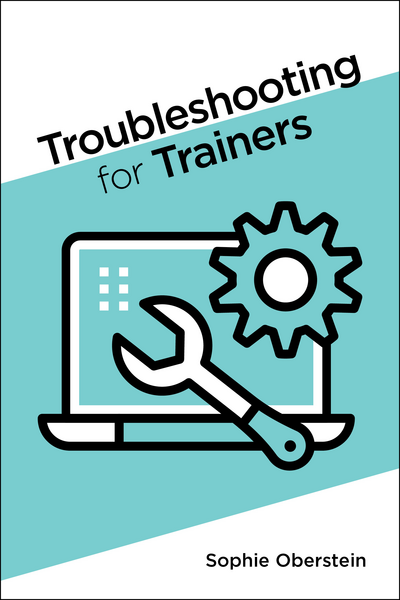ATD Blog
A Resource for Overcoming Training Trouble Spots
Thu Oct 29 2020


L&D professionals center many of their efforts on solving problems for organizations. But where do they turn when they get stuck while developing those learning solutions?
They now can turn to Troubleshooting for Trainers. Author, coach, and consultant Sophie Oberstein has written this new book as a resource dedicated to helping talent development professionals emerge unscathed from the tight spots they encounter on the job. The book’s thematic sections address issues that can cause L&D pros the most angst:
Lack of credibility
Training that isn’t well regarded
Lack of resources
Limited learning design experience
Uncertainty around measurement
Live training surprises
Challenging participants
Most talent development professionals can identify with one or more of the aforementioned trouble spots. “Like a troubleshooting guide that’s part of the operating manual for a new appliance that has started acting up, this book will provide you with in-the-moment fixes and longer-term solutions for some of the common challenges faced by new trainers at every stage in the L&D process,” Oberstein writes in the introduction. However, she extends her advice to address challenges that are relevant and relatable to training pros at all stages of their careers.
The section on lack of credibility, for example, may appeal to those early in their careers. Oberstein speaks to challenges that arise because of a lack of experience and provides advice for those managing their first project. In other sections—such as the one on limited learning design experience—she presents more complex situations, such as how to develop a training course on an unfamiliar topic or how to produce asynchronous e-learning.
The book’s methodical layout establishes its intended use as a resource. A typical section begins with possible issues trainers may face on that particular topic. Oberstein often shares her own experience as well, which enables readers to relate to her.
Next, in a case study format, Oberstein addresses the challenges. Each is numbered, and the main idea is written in big, bold letters—for example, “I’ve been asked to provide training, but I don’t think it’s going to help.” Oberstein describes the challenge, dives into possible solutions, concludes with a bottom-line statement, and suggests additional resources for readers to delve deeper.
In all, Oberstein addresses 45 challenges in the book using what she calls a “problem-solving focus.” Accordingly, the book is not just narrative—it features helpful charts, lists, and practical resources to help trainers. Whether you’re faced with confused learners, complaining participants, or concerns about technology, chances are Troubleshooting for Trainers can point you in the right direction.
Share your ATD Virtual Conference experience on social media. #ATDVirtualConference
